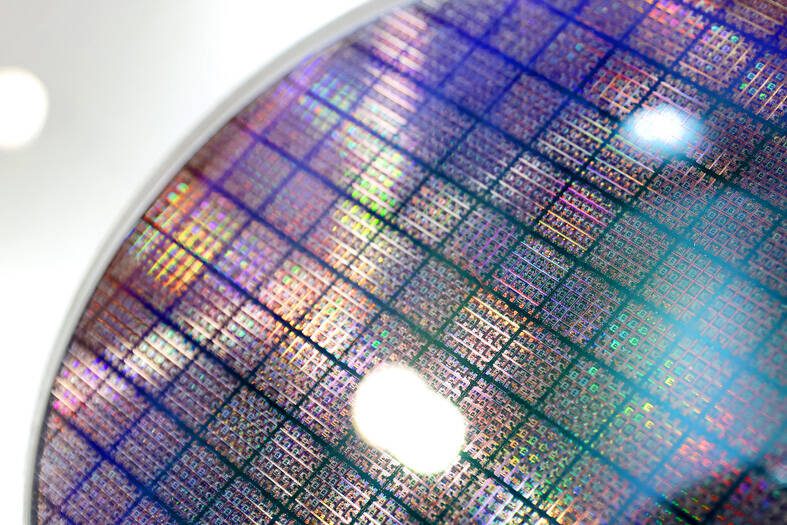European Union-backed chipmaker SiPearl has raised 130 million euros (US$152 million) from investors including Taiwan’s Cathay Venture Inc (國泰創投), as Europe pushes for technological sovereignty.
The French start-up, which makes high-performance, energy-efficient processors for artificial intelligence (AI) and supercomputing, said it would use the Series A financing to invest in research and development and to industrialize its Rhea1 chip, which features 80 cores from chip designer Arm Holdings PLC and more than 61 billion transistors, according to a statement yesterday.
The Rhea1 chip will eventually help to power Jupiter, an EU-backed European supercomputer based in Germany and designed for use in strategic fields such as medical research, energy management and defense. SiPearl has recently appointed Taiwan Semiconductor Manufacturing Co (台積電) to start manufacturing the chip, the company said.

Photo: EPA-EFE
The investment is part of a broader European effort to pursue industrial sovereignty in the field of AI, after the continent missed out on the opportunity to create global internet and cloud companies, relying instead on US and Asian providers.
“The US hyperscalers like Amazon, Microsoft, Google, OpenAI are designing their own chips, and they have the means to do it,” SiPearl chief executive officer Philippe Notton said during a press event. “European cloud players don’t have those means, and will rely on solutions like ours.”
SiPearl is the first French investment for Taiwanese private equity firm Cathay Venture, a subsidiary of Cathay Financial Holding Co (國泰金控), a major investor in semiconductors and electronics. The European Innovation Council Fund, Arm and French IT firm Atos SE also participated in the round.
SiPearl was founded in 2019 and seed-funded by the EU under the European Processor Initiative consortium, which seeks to develop high-performance computing technologies in the continent. The company has 200 employees in France, Spain and Italy, and has set up data centers in France focused on chip design.
SiPearl will be looking to raise 200 million euros for its Series B between next year and 2028, chief financial officer Jean-Luc Gilbert said.

Shares in Taiwan closed at a new high yesterday, the first trading day of the new year, as contract chipmaker Taiwan Semiconductor Manufacturing Co (TSMC, 台積電) continued to break records amid an artificial intelligence (AI) boom, dealers said. The TAIEX closed up 386.21 points, or 1.33 percent, at 29,349.81, with turnover totaling NT$648.844 billion (US$20.65 billion). “Judging from a stronger Taiwan dollar against the US dollar, I think foreign institutional investors returned from the holidays and brought funds into the local market,” Concord Securities Co (康和證券) analyst Kerry Huang (黃志祺) said. “Foreign investors just rebuilt their positions with TSMC as their top target,

H200 CHIPS: A source said that Nvidia has asked the Taiwanese company to begin production of additional chips and work is expected to start in the second quarter Nvidia Corp is scrambling to meet demand for its H200 artificial intelligence (AI) chips from Chinese technology companies and has approached contract manufacturer Taiwan Semiconductor Manufacturing Co (TSMC, 台積電) to ramp up production, sources said. Chinese technology companies have placed orders for more than 2 million H200 chips for this year, while Nvidia holds just 700,000 units in stock, two of the people said. The exact additional volume Nvidia intends to order from TSMC remains unclear, they said. A third source said that Nvidia has asked TSMC to begin production of the additional chips and work is expected to start in the second

REVENUE PERFORMANCE: Cloud and network products, and electronic components saw strong increases, while smart consumer electronics and computing products fell Hon Hai Precision Industry Co (鴻海精密) yesterday posted 26.51 percent quarterly growth in revenue for last quarter to NT$2.6 trillion (US$82.44 billion), the strongest on record for the period and above expectations, but the company forecast a slight revenue dip this quarter due to seasonal factors. On an annual basis, revenue last quarter grew 22.07 percent, the company said. Analysts on average estimated about NT$2.4 trillion increase. Hon Hai, which assembles servers for Nvidia Corp and iPhones for Apple Inc, is expanding its capacity in the US, adding artificial intelligence (AI) server production in Wisconsin and Texas, where it operates established campuses. This

US President Donald Trump on Friday blocked US photonics firm HieFo Corp’s US$3 million acquisition of assets in New Jersey-based aerospace and defense specialist Emcore Corp, citing national security and China-related concerns. In an order released by the White House, Trump said HieFo was “controlled by a citizen of the People’s Republic of China” and that its 2024 acquisition of Emcore’s businesses led the US president to believe that it might “take action that threatens to impair the national security of the United States.” The order did not name the person or detail Trump’s concerns. “The Transaction is hereby prohibited,”